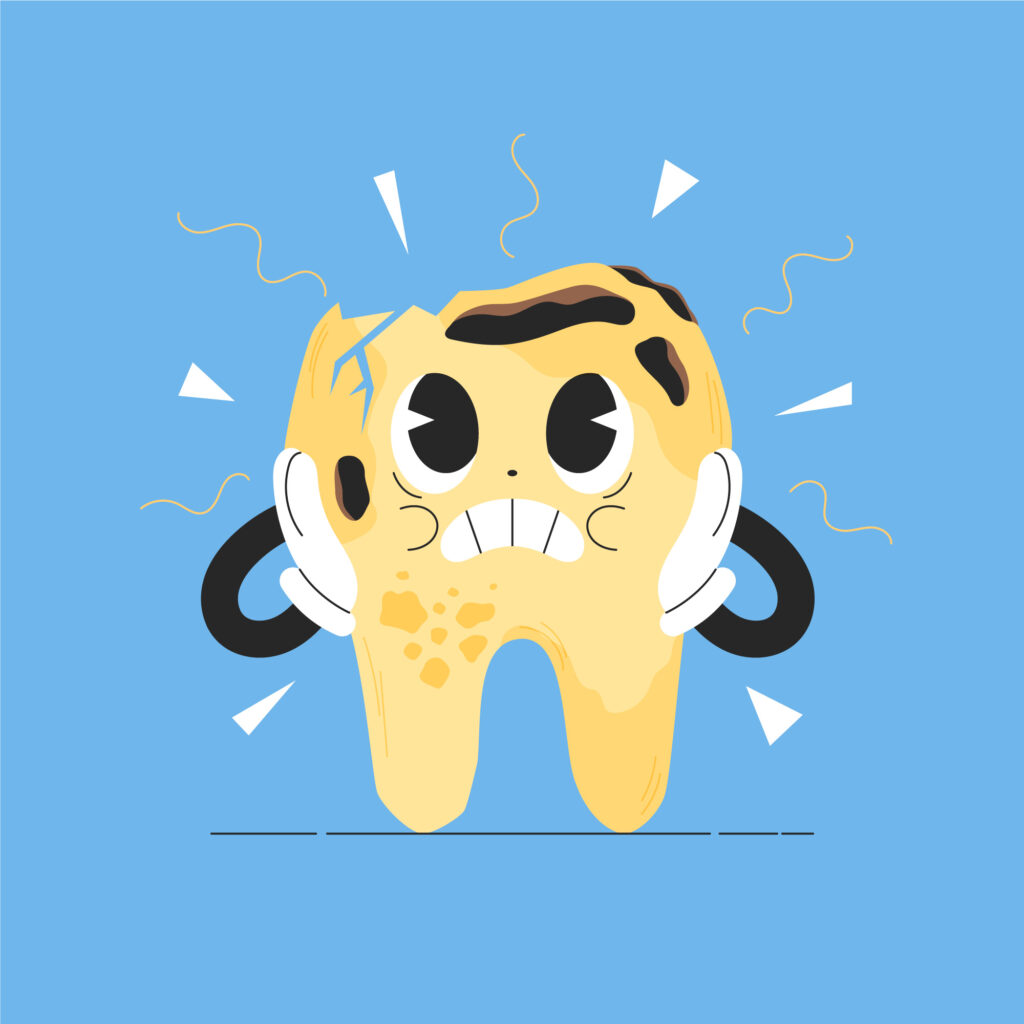
Cracked Tooth
Do you have a Cracked tooth?
A cracked tooth refers to a condition when a tooth has chipped or fractured which generally results in a "sharp tooth" or at worst, a "tooth ache". Cracks can vary in size, depth, and location, impacting the tooth's structure and overall integrity.
Cracked Tooth Syndrome is the dental term used to describe tooth cracks that are causing pain, which is often extremely difficult to localise and treat. Treatment to reduce the risk of a tooth reaching this stage is recommended.
Cracks can be categorised into the following:
- Craze Lines - small hairline cracks in the enamel which are generally painless.
- Fractured cusp - a corner part of the tooth might break away, which generally causes discomfort when the tongue rubs on this area. These generally only cause minor sensitivity, however major cuspal fractures may involve the pulp, resulting in a tooth ache.
- Cracked tooth - a crack extending from the enamel all the way down to the root (but not extending past). If not treated, this could result in tooth loss or a root canal.
- Complex Fracture - same as above, however this involves the pulp (nerve) and generally causes a toothache.
- Split tooth - a complex fracture that has now divided the crown (top) of the tooth into pieces. The only treatment is tooth extraction.
- Vertical Root Fracture (VRF) - a complex fracture that has divided the roots. The only treatment is tooth extraction.
Common Causes
- Grinding or Clenching
- The most common cause of a cracked tooth is parafunction or Bruxism. Excessive forces when you grind or clench your teeth may result in your tooth cracking.
- Large Fillings
- It is not uncommon to see dental work causing cracked teeth. Large fillings weaken the tooth as the walls of the tooth are thinner and hence more susceptible to cracking.
- Missing Teeth
- When you are missing several teeth, your other teeth will inevitably have larger bite forces on them. This may result in your teeth cracking.
- Trauma
- Accidents, knocks on your teeth or sport injuries can result in direct trauma to a tooth, often causing fractures or cracking.
- Hard Foods
- Accidentally chewing on hard foods (eg. nuts, ice, hard candies and even pork crackling) results in excessive pressures on your teeth.
Symptoms
- Pain
- The most notable symptom of a cracked tooth is a sharp or throbbing pain that can sometimes radiate to the jaw, neck or ear.
- Pain when chewing
- Sharp or dull pain can be experienced if the sensitive tooth is related to a crack or fracture
- Sensitivity
- Exposed inner parts of the tooth due to the crack or fracture may result in temperature sensitivity
- Swelling and inflammation of the gums
- The gums might be sore, and can often feel like a gum infection.
Treatment Options
- Bonding or direct restorations
- Uncomplicated fractures or cracks may be "filled" with composite resin.
- Dental Crowns
- For deeper cracks, the recommend option is to crown the tooth. A crown or cap is an indirect restoration (lab-made) that has higher compressive material strength, thus reducing the risk of a tooth splitting.
- Root Canal and Crowns
- Cracks which have extended into the nerve of the tooth will require root canal treatment to prevent infection of the tooth. A crown is placed after the root canal is completed to again reduce the risk of the crack progressing.
- Tooth extraction
- Occlusal Splint
- Grinding guards are often prescribed as an adjunct treatment to help manage cracks in your other teeth
Why Choose Us
- Experienced Dentist
- Our clinic provides comprehensive cracked teeth assessments, addressing both simple and complex cases. While our skilled Dentists assess each situation individually, there may be instances where referral to a Specialist is recommended for optimal care.
- Comprehensive Dental Care
- We have a keen focus on treating your oral health as a whole, not just focusing on your teeth! We look at everything and anything that may affect your oral health. This includes your breathing (airway), your habits, your smile, your goals, your work etc. That's our comprehensive care promise to you.
- Friendly and calming Environment
- Our caring and professional team goes the extra mile (or kilometre in Australia) to create a relaxing experience for every visit. We understand that the dentist (and hence gum treatment) can be a source of anxiety and pain for some, and we work hard to provide a calming environment for all ages.
- We have calming music playing throughout the clinic and TVs to create that serene atmosphere.
- Prevention is better than cure!
- Here at Dental at Keys, we believe that prevention is the key to optimum oral health. That's why we believe in proactive treatment and will teach you the best ways to reduce your risk of another cracked tooth.
Interested?
Contact us now on (03) 8899 6331 or check out our other services here.
Need help with payments?
We also have a variety of Payment Plans available - giving you the flexibility of paying for your sensitive teeth treatment later.

Questions about Cracked teeth?
- Does a cracked tooth hurt?
- Occasionally, pain is not always present with a cracked tooth.
- Should I get treatment if there is no pain?
- It's entirely up to you - however we would suggest a consult with us as soon as possible. Cracked teeth never get better on their own and often progress to tooth loss if not treated in a timely manner.
- Do cracked teeth show up on X-rays?
- Not always, however it is still important to take a base-line X-ray to check for infections.
- How much does it cost to fix a cracked tooth?
- This entirely depends on the type of treatment you will receive (if any) for your cracked tooth. This may range from no treatment, to a root canal and dental crown.
















